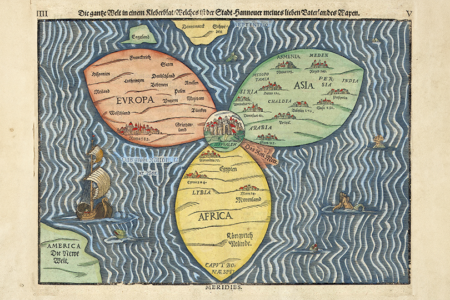The Brazen Laver: Christ Our Sanctification
Exodus 30:17-21; 38:8; 40:7
With hands splattered with blood and with feet soiled from the dust of the tabernacle court, the priest moved quickly but reverently to the brazen laver for cleansing. The words of Moses were fresh in his mind each time he was called upon to serve, “. . . they shall wash with water, that they die not . . .” (Ex. 30:20). Purification before and during service in the tabernacle was mandatory for each priest who ministered before God.
The laver was never used by the congregation, but was provided exclusively for the priest’s purification. During his consecration to the priesthood he had been washed thoroughly at the laver according to the command of Moses,
And Aaron and his sons thou shalt bring unto the door of the tabernacle of the congregation, and shalt wash them with water (Ex. 29:4).
Each year he had watched the high priest wash on the Day of Atonement, put on the holy linen garments, and make an atonement for himself and the children of Israel (Lev. 16:24). But today, he need only wash the defilement from his hands and feet before entering the tabernacle to serve. Carefully dipping his right hand into the laver, he would meticulously wash his right hand and then his right foot; reversing the process, he would wash his left hand and left foot.
The Strategic Position Of The Laver
The priest knew all too well the strategic placing and symbolic meaning of the laver. His sins being atoned for at the brazen altar made it possible for him to approach the tabernacle in worship, but not before he stopped at the brazen laver to wash the defilement of the dusty tabernacle court from his body. It was necessary for him to be both spiritually and physically clean before he could enter into the presence of a holy God in communion and fellowship. The Word of God was clear on this matter, “. . . ye shall be holy; for I am holy. . . ” (Lev. 11:44).
The brazen laver stood in the outer court between the brazen altar and the tabernacle. It contained two parts: the circular brass bowl made from the polished brass mirrors which the women brought with them from Egypt and the brass foot or pedestal (Ex. 38:8). Although the size of the laver is not given, it had to be large enough to hold plenty of water used exclusively by the priest for purification. Fresh spring water, probably from a smitten rock, would be poured continually into the laver for daily purification. The laver had no measurement symbolic of the limitless cleansing power of God.
The Sanctifying Provision Of The Laver
The laver was only used by the priest for purification. We who have put our faith in Jesus Christ are called a “believer-priest”. We are also called a “chosen generation”, a “royal priesthood”, a “holy nation”, and a “people for His own”, so we can offer up spiritual sacrifice and praise which will be acceptable to God by Jesus Christ (1 Pet. 2:5, 9). As Aaron and his sons were born into the priesthood (Ex. 28:1), so each of us enters the priesthood by means of the “new birth” through the “washing (i.e. bath) of regeneration” (Ti. 3:5) in the blood of Jesus Christ. We who have been washed from our sins in the blood of Jesus have been made a “kingdom of priests” (Rev. 1:5, 6).
The ministry of the laver is of great spiritual significance in our Christian experience. In the brazen altar we saw our justification. In the brazen laver we see our sanctification. The water in the laver typifies our cleansing through the Word of God. When Jesus left the Upper Room and headed towards the Garden of Gethsemane just before His betrayal, He stopped in the vineyard of the Kidron Valley and gave the parable of the vine and branches. He said every branch that beareth fruit must be purged so that it might bring forth more fruit. Then He told His disciples, “Now ye are clean through the word which I have spoken unto you” (Jn. 15:3). It is the Holy Spirit who sanctifies and cleanses us through the washing of water by the Word of God (Eph. 5:26), preparing us for service in Christ.
What do we mean by being “sanctified”? The word “sanctified” means to be “set apart”. First, we are to be set apart from sin both spiritually (2 Chron. 29:5, 15-18) and physically (1 Thess. 4:3). Secondly, we are set apart unto divine service through Christ our High Priest (1 Cor. 1:2; 6:11).
Sanctification is described in three ways. First, we are positionally sanctified. We have been eternally sanctified unto God the moment we accept the atoning work of Jesus Christ for our justification (Heb. 10:10, 14; 13:12). Instantaneously we are separated from sin unto salvation. It is called positional sanctification because it is a position of standing before God which does not depend upon our daily walk for its maintenance – although this position should lead us to holy living.
Secondly, we are progressively being sanctified. This is a process where we are daily sanctified as we walk in obedience before God, separating ourselves from sin and allowing the Holy Spirit to cleanse us through the washing of water by the Word of God (Jn. 17:17). A believer progresses in sanctification as he appropriates and applies the Word of God to his life (2 Pet 3:18; 2 Tim. 2:19-21).
Thirdly, we will be perfected in sanctification. The believer is promised an ultimate (i.e. complete) sanctification. We will be perfected when we receive our resurrected bodies at the Second Coming of the Lord (Eph. 5:27). At that time we will be conformed to the image of Jesus Christ (Rom. 8:29) for we shall be like Him (1 John 3:2).
Four agents are involved in our sanctification. The Father chastens us of sin (Heb. 12:10); the Son provides the means for our sanctification through His shed blood (Heb. 13:12); the Holy Spirit applies the truth of God’s Word to our life (2 Thess. 2:13; 1 Pet. 1:2); and we are to separate ourselves voluntarily from sin (2 Cor. 7:1).
The Servant’s Purification By The Lord
The need for purification in our walk is beautifully illustrated in the final hours of our Lord’s ministry here on earth when He washed His disciples’ feet (Jn. 13:1-10). Rising from the Passover table, Jesus took a towel and a basin of water and began to wash the disciples feet.
When it was Peter’s turn to be washed he blurted out, “. . . thou shalt never wash my feet . . . ” (v. 8). Jesus quickly informed Peter, “. . . if I wash thee not, thou hast no part with me” (v. 8).
Jesus was not saying, “Peter, if I don’t wash your feet you can have no relationship with me,” for his relationship with the Lord had already been established. But Jesus was saying, “Peter, if I don’t wash your feet you can have no fellowship or communion with me.” As usual, impetuous Peter went overboard and responded, “. . . Lord, not my feet only, but also my hands and my head” (v. 9).
Jesus answered Peter by saying, “. . . he that is washed needeth not except to wash his feet . . .” (v. 10). What is Jesus saying? The two words “washed” and “wash” in the tenth verse have different meanings. The word “washed” (gr. louo) means to bathe one’s body completely. It speaks of our complete ablution which takes place when we are declared justified at our salvation. The word “wash” (gr. nipto) is used to those who wash their hands and feet symbolizing our sanctification. The picture is of one returning from a public bathhouse to his own home. His body being completely bathed he needs only to wash the dust from his feet in order to be clean when he enters into his house.
The teaching is that we who have been thoroughly cleansed through the blood of Jesus Christ must still be cleansed in our daily walk with the Lord. Daily sins must be confessed to God in order to maintain an unbroken communion and fellowship with Him. John explicitly stated this when he wrote,
If we say that we have no sin, we deceive ourselves, and the truth is not in us. If we confess our sins, he is faithful and just to forgive us our sins, and to cleanse us from all unrighteousness (1 Jn. 1:8, 9).
When the priest washed at the laver he would see his image reflected from the brass mirrors used in its construction. We have already seen in previous articles that brass typifies Christ in His ministry of judgment. The mirrors speak of the Word of God which reveals and reflects our sinful purposes and intentions. The writer of the book of Hebrews put it so well when he wrote,
For the word of God is quick, and powerful, and sharper than any two edged sword, piercing even to the dividing asunder of soul and spirit, and of the joints and marrow, and is a discerner of the thoughts and intents of the heart (Heb. 4:12).
It will be on the basis of the Word of God that Christ will judge men in the Day of Judgment (Jn. 12:48).
The brass also speaks of the believer’s self-judgment which he is expected to exercise when he sins. Paul tells us, “For if we would judge ourselves, we should not be judged” (1 Cor. 11:31). But if we refuse to judge our sin the Lord will chasten us (Heb. 12:6) back to communion and fellowship, so we will not be condemned with the world (1 Cor. 11:32). The chastening process is not enjoyable, in fact, it can be very grievous, but it produces righteousness and holiness in us (Heb. 12:10, 11). If the Christian persists in his sin after being chastened by the Lord, the Lord might bring judgment on him in the form of weakness, sickness, or even premature death (1 Cor. 11:30). It is the Word of God, appropriated and properly applied, which will prevent us from falling into sin (Ps. 119:1), keep us in our walk before the Lord (Josh. 1:8), and make our fellowship sweet in Him.
The Servant’s Privilege Before The Lord
As believer-priests who have been justified and sanctified, we are now ready to offer worship and service unto the Lord. The greatest privilege of all is to have (and the Old Testament believers did not) direct access into the presence of God (Heb. 10:19-22). The priest, being cleansed for service, is now ready to enter into the Holy Place for communion with a holy God. We who are cleansed in our walk before God are ready to do the same.
David summed up our standing before the Lord so clearly when he wrote,
Who shall ascend into the hill of the Lord? or who shall stand in his holy place? He that hath clean hands, and a pure heart . . (Ps. 24:3, 4).
We who have been cleansed by the washing of the water by the Word of God will receive as the psalmist says, “. . . blessings from the Lord, and righteousness from the God of his salvation” (Ps. 24:5).
Let us respond to the admonishment from the Lord,
But as he which hath called you is holy, so be ye holy in all manner of life;
Because it is written, Be ye holy; for I am holy (1 Pet. 1:15, 16).
Only then will we be able to walk through the veil into the holy presence of our Lord and then out into each new day prepared for spiritual service for Him.






